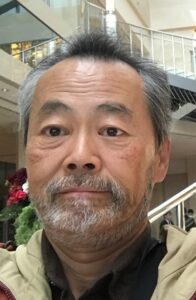|
Jun Shimada – I am a self-employed man living in Tokyo. After graduating from university, I worked for an IT company, then moved to a real estate company and retired at the age of 65. I think there is some stuttering now, but I do not care much. I am a member of the Yokohama Genyukai (Group of Japanese stutterers). |
Teenage years
I started being conscious of stuttering at elementary school. It was said at that time that I had become a stutterer because I imitated a stutterer in the neighborhood. When I was asked by my teacher at school to answer a question, I stuttered and could not answer, so I felt frustrated.
As a result, I started to study hard on written tests, and I was looking forward to the test. If you have what you like and what you are good at, the ratio of stuttering will be reduced and it will be effective.
High school life was the worst time of my life. Graduation was delayed by one year because of stuttering. Like other stutterers, I could not buy what I liked, and at that time I had to buy train tickets at the counter. When I went to Kemigawa station in Chiba prefecture, it was hard to say the letter “k” and I was worried for many days. In the end, I bought a ticket for a station farther away and easier to say.
At that time, there were no mobile phones, emails, or SMS to contact friends or a favorite girl, only calls home that I was not good at. There were times when I stuttered over the phone and could not get connected.
The years of my 20’s
My situation changed when I entered university. I joined the Tokyo Genyukai at the age of 19. After that, my friends at Genyukai supported me and each other.
After graduating, I got a job at an IT company. When I started working in Hiroshima, I set up a Hiroshima Genyukai with friends I could contact.
There were many hard times when I was working. I stuttered and could not handle the phone, so my boss and customers got angry. When I called to the head office and repeated “Ah, Ah,” she said, “You are Shimada-san in Hiroshima?” before I said my name.
However, as the position increased, the importance of important work increased, and the stuttering trouble itself was reduced.
For me, the effects of resilience and bouncing back from stuttering are as follows.
- Joined Genyukai at the end of my teens. By interacting with many stuttering friends, I was able to live a social life without worrying about stuttering through various activities of Genyukai.
- I got married and had a family at the end of my twenties. I had to take responsibility for my wife and my child. Due to a social life, many problems other than stuttering have occurred, and the time spent stuttering has become relatively short.
- Then, in my thirties, at the World Congress in Kyoto (held in 1986), I learned that there were stutterers all over the world.
Later years
I am 69 now, but I am traveling the world and actively speaking to many people overseas. We not only meet and speak, but communicate with people all over the world in words of various means.
This is my Journey of Words. I have traveled more than 130 times in the past and now have friends with Taiwanese, Koreans, Chinese, Thais, Indians, British and Americans.
Currently, as part of my life work, I am visiting the battlefields of World War II and conducting research and memorial services.
When I cannot do Journey (of Words) in person, I do Journey of Words on Facebook to promote international friendship with people of many countries.
![]()


Thank you so much for your story. I recognize so much. From not travelling to now have travelled the world. To have to redo one class because of my stuttering. And to find the stuttering comminuty. So happy you can look back at your journey with pride, turning your struggles into victories. Hope we’ll meet in person or at least in cyber space.
Stay safe and keep talking
Anita
Thank you for this wonderful piece Jun and I can picture how mentally defeating it was for you to purchase that train ticket to a different stop simply because you could not say the word. It is amazing to me though how much we can transform when we take ACTION like you did by joining Tokyo Genyukai, What was the biggest impact that group had on you and love to hear more about what the stuttering awareness is like in Japan.
I would love to connect with you more as I work at SMBC, which as you know is one of the largest banks in Japan so am keen to hear more about you and your experiences with dealing with your stutter in Japan.
Thank you for sharing your story Jun. I love your comment, ” If you have what you like and what you are good at, the ratio of stuttering will be reduced and it will be effective.” This is a point I make to parents through my advocacy work. Helping a person find their passion, excel, and contribute in life is so much more important than fixing a stutter. Thank you – and if you ever get to Minnesota (U.S.) please connect!!
Jun Shimada,
Thank you for sharing your story! You mentioned a time when you had to catch a train to another city because “k” was difficult to say. I would assume you needed to be in Kemigawa– so after catching a train to a different city, how did you communicate your way to the city you had initially planned on?